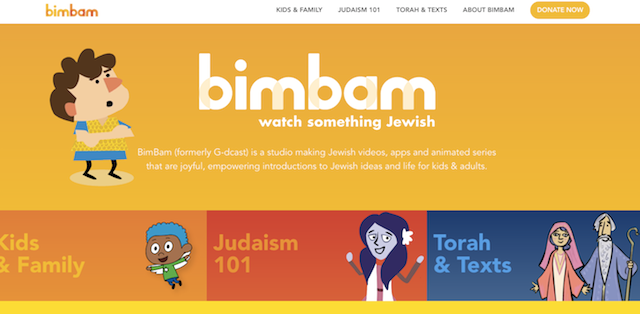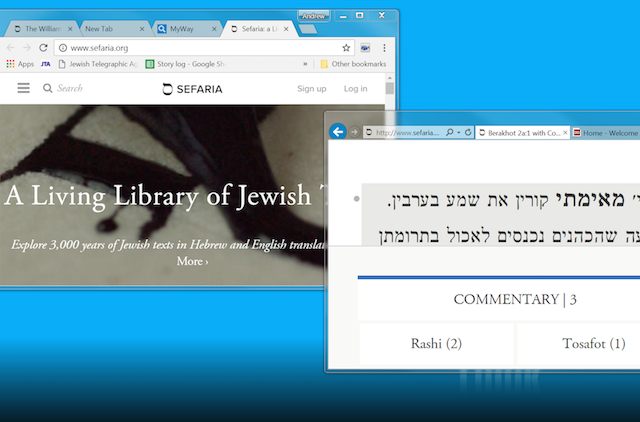Where is Judaism? That may seem like a pretty unimportant question when compared to hot-button topics like “Who Is a Jew” or “Why Be Jewish.”
Today, however, the locations of Judaism are rapidly shifting, bringing the question of “where” to the forefront. In a sense, we are watching a 21st-century “immigration” of Judaism to the Internet that may be no less significant than the vast immigration of Eastern European Jews to America in the late 19th and early 20th centuries.
Below we help you navigate your way through it by featuring a variety of ways (in addition to using My Jewish Learning, of course) that you can experience Jewish learning on your own, from the comfort of your home, in our digital world. All the resources below are, like My Jewish Learning, nondenominational and open to all. Please note that all prices are subject to change.
Find out how to learn Hebrew here — and find a Judaism 101 class here. Get help finding a Jewish study partner here and check out our list of resources for studying the weekly Torah portion.

Help us keep Jewish knowledge accessible to millions of people around the world.
Your donation to My Jewish Learning fuels endless journeys of Jewish discovery. With your help, My Jewish Learning can continue to provide nonstop opportunities for learning, connection and growth.
Did we miss something? Email us at community@myjewishlearning.org with suggestions.
Traditional Jewish Texts
Bimbam
Formerly G-dcast, Bimbam “creates and distributes fun, accessible, and smart digital media about Judaism for kids, adults, and families who want to spend quality time online.” In addition to offering short, animated videos for each portion (you also can find these on My Jewish Learning’s Torah portion pages), it also has videos on other Jewish texts, holiday observance, apps teaching about everything from challah-baking to biblical sacrifices and a kids’ series called Shaboom about Jewish values. Bimbam’s offerings are beginner-friendly, but also can deepen understanding for those with more background knowledge. Many of its videos are embedded on My Jewish Learning, but the full collection, as well as supplementary materials, can be found on its site. (Videos are free, some supplementary materials are for a fee.)
Mechon Hadar
A New York-based educational institution that seeks to empower Jews to create and sustain vibrant, practicing, egalitarian communities of Torah learning, prayer and service. For those unable to make it to Hadar’s classes in Manhattan, it provides an extensive body of resources in the “Torah Online” section of its website. In addition to weekly commentaries on the Torah portion, the site offers hundreds of downloadable or streamable audio recordings and videos organized in nine core themes ranging from “Gender and Sexuality” to “Kashrut and Food.” Its occasional podcast, entitled Responsa Radio and accessible on the Hadar site or in the iTunes store, explores how to apply Jewish legal principles to contemporary life. Most materials are geared toward intermediate and advanced learners. (Free)
Sefaria
Use this site to find texts in Hebrew or English, such as sections from the Bible or Talmud, or search its vast and growing digital library of source sheets, organized by topic, which synthesize materials related to a particular theme (such as punishment, angels or responsibility) or Jewish figure (such as Joseph, Ruth or Maimonides). Many texts, like the entire Bible and Mishnah, are available in Hebrew, English, or with both languages side by side, while other texts are available only in their original Hebrew or Aramaic. Another particularly strong feature of the site is its cross-referencing tool, which provides links to texts when one provides commentary on another or when two texts touch on similar themes. (Free)
Big Jewish Ideas
ELI Talks
10-15 minute video presentations by a diverse range of speakers address issues like religious engagement, Jewish literacy and Jewish identity. With over 100 videos currently available on its website, ELI Talks is for anyone interested in how Jewish concepts apply to our ever-changing world. Some talks are designed for an audience with some previous Jewish knowledge, while others are geared towards beginners. (Free)
JDOV
Like ELI Talks, but based in the United Kingdom, JDOV offers short video presentations from over a hundred different speakers, all touching on Jewish subject matter and applying it to today’s world. (Free)
Judaism Unbound
Its eponymous podcast invites leading thinkers and doers to discuss the evolving nature of 21st century Judaism. Its website also offers initiatives such as Unbound, High Holidays Unbound and Unbound, which offer new ways of engaging with the yearly cycle of Jewish holidays. Its materials ask big questions about the past, present and future of Judaism, but are designed to be accessible to those with minimal knowledge of Jewish history or texts. (Free, and in interest of full disclosure, the author of this piece co-hosts Judaism Unbound’s podcast and coordinates many of its other digital offerings).
Jewish Podcasts

A vast and growing array of podcasts engage with Jewish text, culture and tradition — and are perfect to listen to while you commute to work or do the dishes or laundry. We encourage you to explore the iTunes store to discover more, but we’ve included a sampling below, along with the average length of each episode. All of the podcasts below are available free of charge.
Can We Talk?
This show, hosted by the Jewish Women’s Archive, highlights little-known stories of Jewish women, both past and present. (Monthly, 12-20-minute episodes)
JPMedia: Talking in Shul
A roundtable discussion looking at spiritual and cultural issues, ranging from synagogue fundraising to sufganiyot — Israeli jelly doughnuts. (Monthly, 60-90 minutes)
TREYF
A self-described “debatably Jewish podcast,” it examines current events, both in the Jewish community and beyond, through the lens of progressive activism. (Bi-weekly, 30-50 minutes)
Other Resources
Darshan Yeshiva
A pluralistic, online school, designed to provide access to anyone looking for an introduction to Judaism, its “Judaism for Beginners” program addresses Jewish texts, holidays, prayers, history, lifecycle events and Hebrew in dozens of videos, podcasts, handouts and other resources. Materials are available for a one-time payment of $45; more expansive program in Comprehensive Judaic Studies available for either $25 or $65 a month over the course of 10 months, depending on the program of study chosen. Shorter modules are also available for $3-$5 apiece.
Pardes: Elmad
Pardes, a nondenominational Jewish learning community in Jerusalem, offers a library of online resources on its website Elmad (meaning “I will learn” in Hebrew). Designed for learners familiar with Hebrew terminology and Jewish text study, it provides dozens of audio recordings of varying lengths, on subject matter ranging from the weekly Torah portion to Jewish education to Judaism and modernity (among many other topics). Though primarily audio, Elmad offers an assortment of videos and written materials as well. (Free)





